Sorting arrays in Excel VBA is useful when working with data that’s not stored directly on the worksheet, such as temporary lists, lookup tables, or custom datasets. Arrays let you handle large amounts of data in memory, and sorting them makes your code more powerful and efficient.
In this article, you will learn three practical VBA methods to sort arrays. We’ll cover how to sort a 2D array using WorksheetFunction, implement a custom bubble sort for more control, and sort values while pulling data from a range into an array.
Steps to sort a 2D Array by a specific column (Quantity) in VBA
➤ Press Alt + F11 , choose Insert >> Module, and paste the following code:
Sub Sort2DArrayByColumn()
Dim data As Variant
Dim i As Long, j As Long
Dim temp As Variant
Dim numRows As Long, numCols As Long
' Load 2D array with product data: {Product, Category, Quantity}
data = Array( _
Array("A1001", "Tools", 10), _
Array("B2002", "Office", 15), _
Array("C3003", "Kitchen", 8), _
Array("D4004", "Tools", 20), _
Array("E5005", "Office", 12) _
)
numRows = UBound(data)
numCols = UBound(data(0))
' Sort by 3rd column (Quantity) in ascending order
For i = 0 To numRows - 1
For j = i + 1 To numRows
If data(i)(2) > data(j)(2) Then
temp = data(i)
data(i) = data(j)
data(j) = temp
End If
Next j
Next i
' Output sorted array to Immediate Window
For i = 0 To numRows
Debug.Print data(i)(0) & vbTab & data(i)(1) & vbTab & data(i)(2)
Next i
MsgBox "2D array sorted by Quantity column.", vbInformation
End Sub
➤ Press Alt + F8 , run Sort2DArrayByColumn, and view the sorted result in the Immediate Window (Ctrl + G).
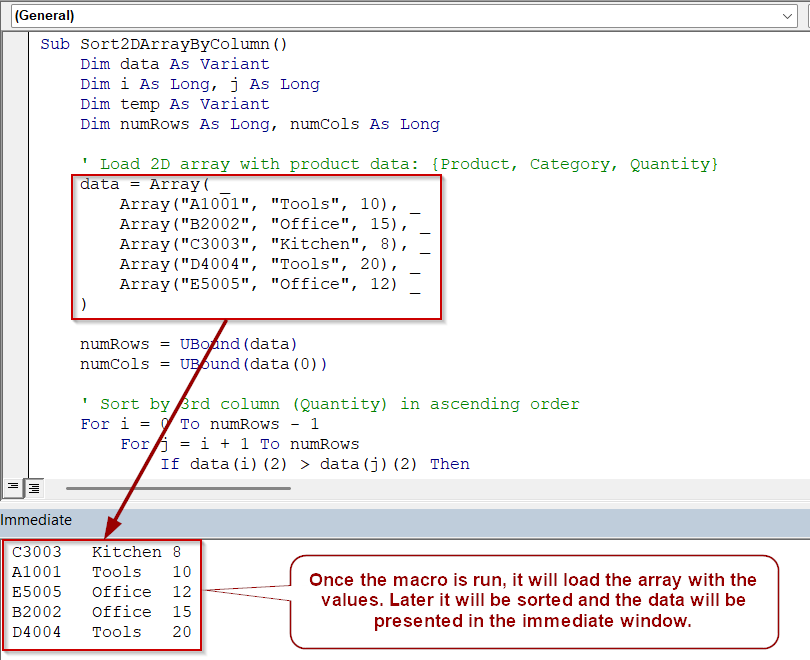
Sort a 1D Array Using Bubble Sort in VBA (with Message Box Output)
When you’re working with a small set of values inside an array, like a list of prices, you might want to sort them without writing the values into cells first. Bubble Sort is a beginner-friendly sorting technique that uses simple nested loops to organize items in ascending or descending order. While not the fastest, it’s perfect for learning and small-scale data.
In this method, we’ll load a 1D array of prices, sort it in ascending order using Bubble Sort, and display the sorted values in a message box.
Steps:
➤ Open Excel and press Alt + F11 to launch the VBA editor
➤ Go to Insert >> Module
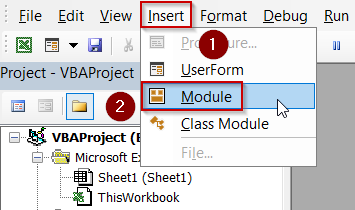
➤ Paste this code:
Sub SortPriceArray()
Dim i As Long, j As Long
Dim Temp As Variant
Dim prices() As Variant
' Load the array with price values
prices = Array(150, 40, 25, 950, 65)
' Bubble Sort: Ascending Order
For i = LBound(prices) To UBound(prices) - 1
For j = i + 1 To UBound(prices)
If prices(i) > prices(j) Then
Temp = prices(j)
prices(j) = prices(i)
prices(i) = Temp
End If
Next j
Next i
' Output the sorted prices as a message box
MsgBox Join(prices, vbCrLf)
End Sub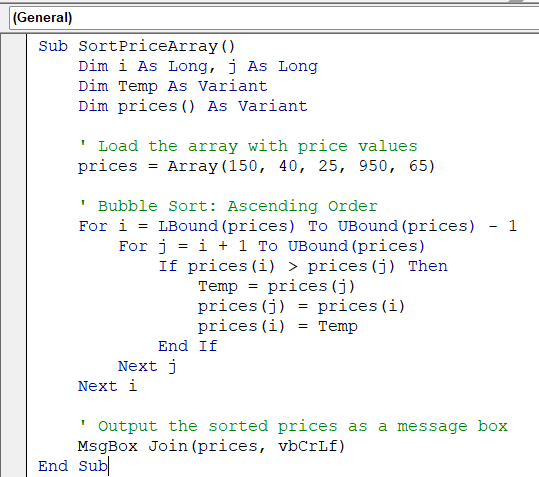
➧ The nested loops implement the Bubble Sort algorithm by comparing and swapping values in ascending order
➧ LBound and UBound set the loop limits to cover all elements in the array
➧ Join(prices, vbCrLf) merges the sorted array into a single string with line breaks and displays it in a message box
➤ Return to Excel, press Alt + F8 , select SortPriceArray, and click Run
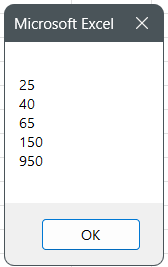
➤ A message box will appear showing the sorted prices in ascending order
➤ You can also sort the array in the other direction, eg: highest to lowest by changing this line of code-
If prices(i) > prices(j) Thento this line of code-
If prices(i) < prices(j) Then➤ You would then get the following message box:
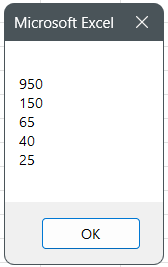
Using QuickSort to Sort a 1D Array in VBA
When you need to sort large datasets inside an array efficiently, QuickSort is a powerful and fast recursive sorting algorithm. Unlike Bubble Sort, which compares elements one by one, QuickSort divides the array into partitions and sorts them recursively, making it much faster for larger lists.
In this method, we’ll define a 1D array of numbers, apply QuickSort to arrange them in ascending order, and display the sorted result in a message box.
Steps:
➤ Open Excel and press Alt + F11 to launch the VBA editor
➤ Go to Insert >> Module and paste this code:
Sub QuickSortArray()
Dim prices() As Variant
Dim i As Long
' Load the array with price values
prices = Array(150, 40, 25, 950, 65)
' Apply QuickSort
Call QuickSort(prices, LBound(prices), UBound(prices))
' Output sorted prices in a message box
MsgBox Join(prices, vbCrLf)
End Sub
Sub QuickSort(arr() As Variant, first As Long, last As Long)
Dim low As Long, high As Long
Dim mid As Variant, temp As Variant
low = first
high = last
mid = arr((first + last) \ 2)
Do While low <= high
Do While arr(low) < mid
low = low + 1
Loop
Do While arr(high) > mid
high = high - 1
Loop
If low <= high Then
temp = arr(low)
arr(low) = arr(high)
arr(high) = temp
low = low + 1
high = high - 1
End If
Loop
If first < high Then QuickSort arr, first, high
If low < last Then QuickSort arr, low, last
End Sub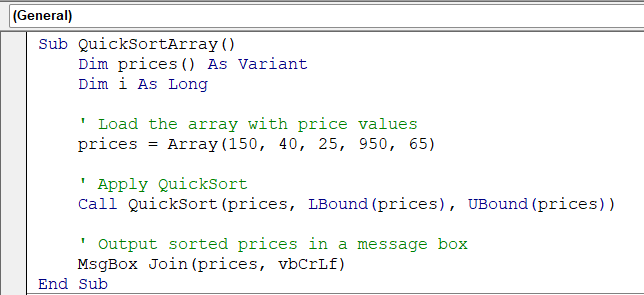
➧ The QuickSort procedure is recursive, it selects a middle pivot and organizes smaller values before and larger values after, repeating this for each partition
➧ The values are sorted entirely within memory without writing to the worksheet
➧ Join(prices, vbCrLf) converts the sorted array into a string and displays it in a message box
➤ Press Alt + F8 , select QuickSortArray, and click Run
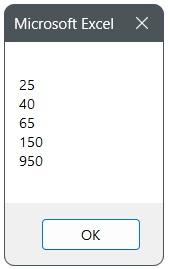
➤ A message box will appear showing the sorted prices in ascending order
➤ You can also sort the array in the other direction, eg: highest to lowest, by changing this line of code-
Do While arr(low) < midto this line of code-
Do While arr(low) > mid➤ You would then get the following message box:
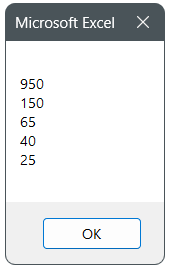
Sort a 2D Array by Specific Column Using VBA
When working with tabular data stored in a 2D array, like product info or transaction records, you may want to sort it by a specific column, such as Quantity or Score. This method shows how to sort a two-dimensional array in VBA based on one of its columns (e.g., the third column), just like sorting a table by a field.
In this method, we’ll define a 2D array with product data, sort it by the Quantity column (column 3), and display the sorted result in the Immediate Window.
Steps:
➤ Open Excel and press Alt + F11 to open the VBA editor
➤ Go to Insert >> Module and paste this code:
Sub Sort2DArrayByColumn()
Dim data As Variant
Dim i As Long, j As Long
Dim temp As Variant
Dim numRows As Long, numCols As Long
' Load 2D array with product data: {Product, Category, Quantity}
data = Array( _
Array("A1001", "Tools", 10), _
Array("B2002", "Office", 15), _
Array("C3003", "Kitchen", 8), _
Array("D4004", "Tools", 20), _
Array("E5005", "Office", 12) _
)
numRows = UBound(data)
numCols = UBound(data(0))
' Sort by 3rd column (Quantity) in ascending order
For i = 0 To numRows - 1
For j = i + 1 To numRows
If data(i)(2) > data(j)(2) Then
temp = data(i)
data(i) = data(j)
data(j) = temp
End If
Next j
Next i
' Output sorted array to Immediate Window
For i = 0 To numRows
Debug.Print data(i)(0) & vbTab & data(i)(1) & vbTab & data(i)(2)
Next i
MsgBox "2D array sorted by Quantity column.", vbInformation
End Sub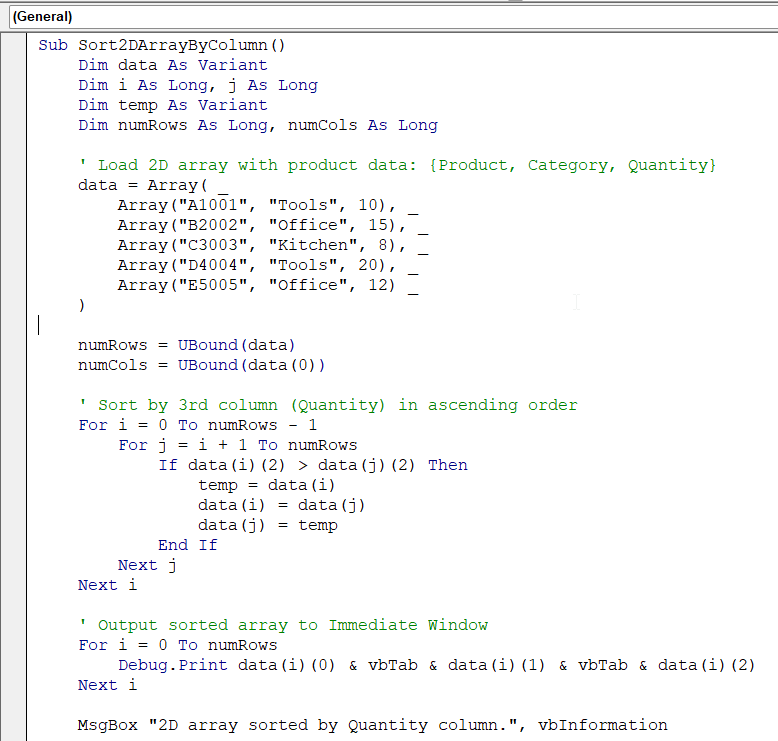
➧ The third field (index 2) represents the Quantity, which is used for sorting
➧ The nested loop uses a simple Bubble Sort to reorder rows based on the Quantity column
➧ Debug .Print writes each row of the sorted array to the Immediate Window (press Ctrl + G in the VBA editor to view it)
➤ Press Alt + F8 , select Sort2DArrayByColumn, and click Run
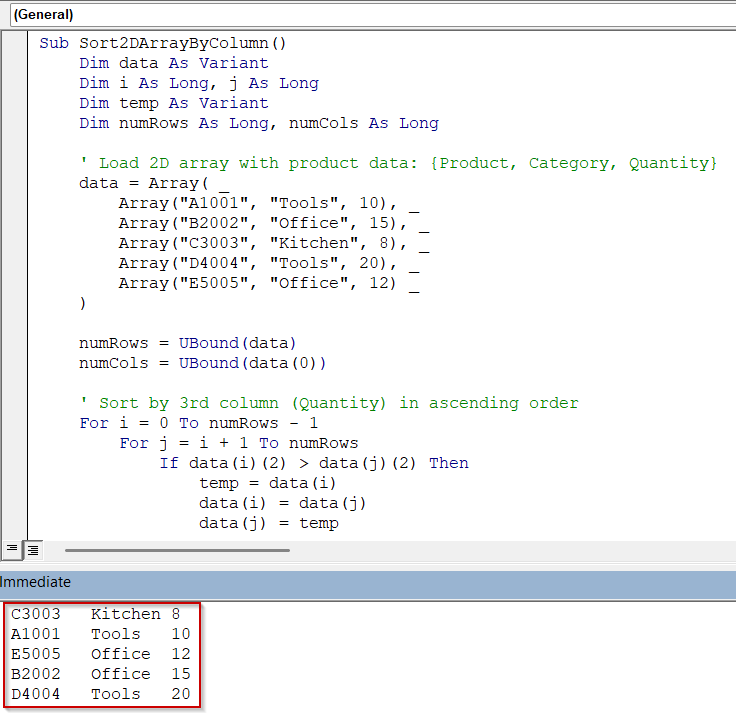
➤ The Immediate Window will show the product data sorted by Quantity in ascending order
Loading and Sorting a Multidimensional Array by Each Column Using VBA
Sorting a 2D array by each of its columns can be helpful when analyzing small grid-like datasets directly in memory. This method demonstrates how to sort a 5×3 multidimensional array using nested loops. Instead of sorting by just one column, this approach sorts each column independently, from left to right, with a simple comparison technique.
In this method, we’ll create a 5-row by 3-column 2D array, sort each column in ascending order, and display the results in the Immediate Window.
Steps:
➤ Open Excel and press Alt + F11 to open the VBA editor
➤ Go to Insert >> Module and paste this code:
Sub SortMultiDimArray()
Dim arr(1 To 5, 1 To 3) As Variant
Dim i As Long, j As Long, k As Long
Dim temp As Variant
' Load values into the 2D array (5 rows, 3 columns)
arr(1, 1) = 5: arr(1, 2) = 3: arr(1, 3) = 7
arr(2, 1) = 1: arr(2, 2) = 9: arr(2, 3) = 2
arr(3, 1) = 6: arr(3, 2) = 8: arr(3, 3) = 4
arr(4, 1) = 2: arr(4, 2) = 4: arr(4, 3) = 9
arr(5, 1) = 3: arr(5, 2) = 1: arr(5, 3) = 8
' Sort each column independently (ascending order)
For j = 1 To 3
For i = 1 To 4
For k = i + 1 To 5
If arr(i, j) > arr(k, j) Then
temp = arr(i, j)
arr(i, j) = arr(k, j)
arr(k, j) = temp
End If
Next k
Next i
Next j
' Print the sorted array to Immediate Window
For i = 1 To 5
For j = 1 To 3
Debug.Print arr(i, j);
Next j
Debug.Print
Next i
MsgBox "Multidimensional array sorted by each column.", vbInformation
End Sub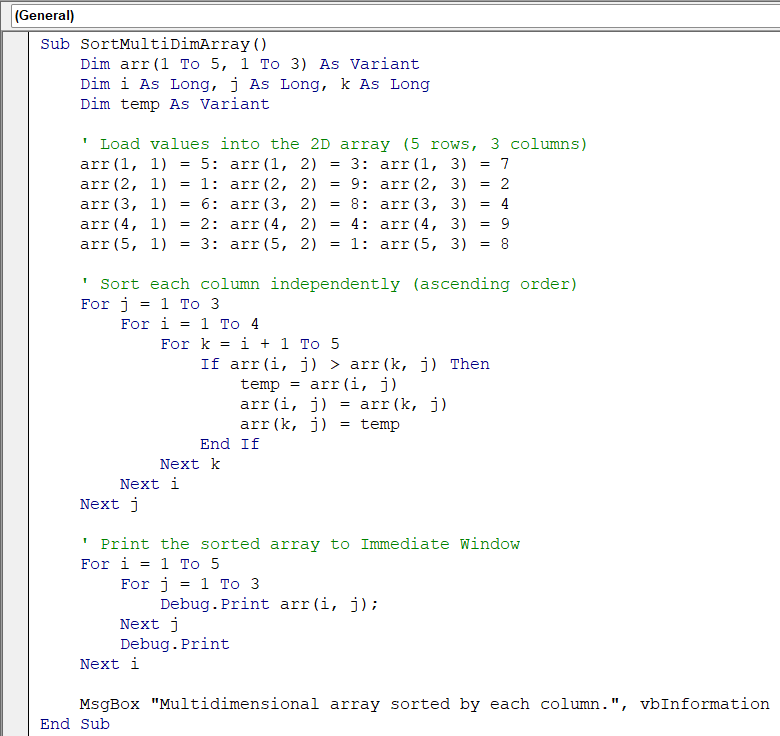
➧ The nested loop structure sorts the values in each column independently using a simple comparison and swap process
➧ The outermost loop cycles through each column, and the inner loops compare and sort the elements in that column
➧ The result is printed directly to the Immediate Window (Ctrl + G to view it), with each row on a new line
➤ Press Alt + F8 , select SortMultiDimArray, and click Run.
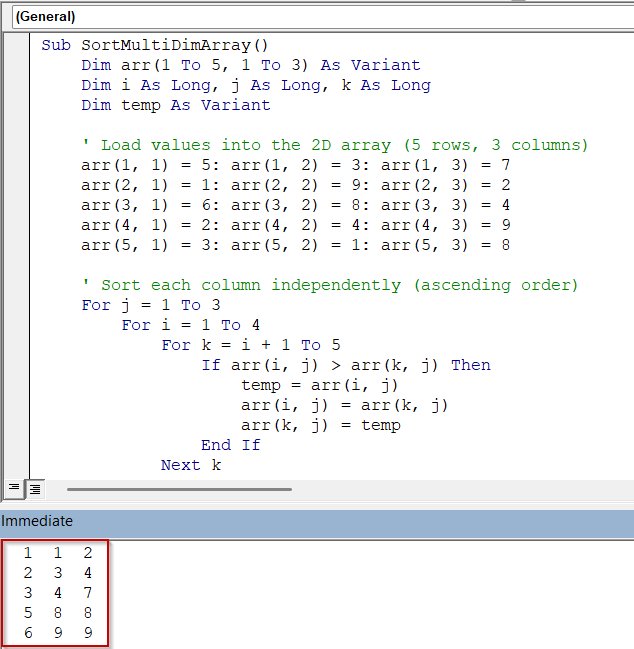
Frequently Asked Questions
Can you use .Sort or .Reverse on VBA arrays directly?
No, those methods are available only in VB.NET. In VBA you must use Application.WorksheetFunction.Sort, ArrayList, or implement custom algorithms like Bubble or QuickSort.
What is the fastest way to sort a VBA array?
The quickest approach is to transfer the array to a worksheet, use Excel’s native Sort, and read it back. It beats manual Bubble Sort for large datasets.
Does Excel 365 support sorting arrays natively in VBA?
Yes, Excel 365 dynamic array-enabled versions allow Application.WorksheetFunction.Sort(yourArray), which returns a sorted variant without needing manual loops.
How can I sort a 2D array by one column?
You can adapt QuickSort to 2D arrays by passing the column index as a parameter. A pivot-based QuickSort sub sorts rows based on that specific column
Wrapping Up
Sorting arrays in Excel VBA gives you full control over how your data is organized, without relying on worksheet cells. Whether you’re working with a simple 1D list or a 2D table-like structure, VBA lets you implement everything from beginner-friendly Bubble Sort to efficient QuickSort techniques. By mastering these array-based sorting methods, you can streamline your automation tasks and handle data with greater speed and precision, all directly in memory.


